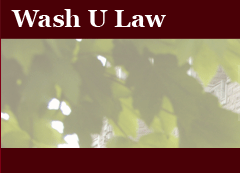Introduction: Re-Engineering Patent Law and the Challenge of New Technologies
Publication Title
Washington University Journal of Law & Policy
Abstract
The constitutionally mandated purpose of the U.S. patent system is to promote the progress of “useful Arts”— or in more modern parlance, to promote technological innovation. Congress is empowered to accomplish this purpose by securing for limited times to inventors the exclusive right to their discoveries. However, to ensure that the grant of exclusive patent rights does in fact promote— rather than retard— technological innovation, each of the institutional actors in the U.S. patent system— Congress, the courts, and the U.S. Patent and Trademark Office— must perennially balance the need to provide inventors with adequate incentives to innovate against the public interest in having access to and fostering a competitive marketplace for innovations.
In keeping with this overall approach to the topic of this symposium, nine rising young patent law academics were asked to present papers on a topic of their choice, the only specified parameters being that they focus 1) on current patent policy issues; 2) particularly those with an international, comparative, or interdisciplinary dimension; and 3) more particularly still, those policy issues that might relate to biotechnology law or the life sciences. In response, these nine authors produced a wide range of complementary papers that seemed to fall rather naturally into three overlapping clusters. Three of the papers address particular administrative issues of patent policy confronting the PTO; three papers address issues of judicial— i.e. CAFC— supervision of patent policy in the U.S.; and three papers focus on international and/or comparative issues of patent policy. Accordingly, the articles are grouped under these three general headings. To underscore the importance of international and comparative aspects of patent policy, the final section of the symposium includes two supplemental articles in addition to the three papers presented at the conference. The first is an article by Dr. Nuno Pires de Carvalho, who is on the staff of the World Intellectual Property Organization and served as one of the three keynote speakers at the conference. The second is an article by Professor Joseph Straus, Professor of Law at the Universities of Ljubljana and Munich, and Head of Department at the Max-Planck Institute for Foreign and International Patent, Copyright and Competition Law, Munich. Dr. Straus was to have been a paper presenter at the conference but because of a schedule conflict was not able to attend. However, he graciously allowed and secured permission for the Washington University Journal of Law & Policy to publish a slightly amended text of the Katz-Kiley Lecture which he gave at the University of Houston Law Center on November 3, 1999.
Recommended Citation
Charles R. McManis,
Introduction: Re-Engineering Patent Law and the Challenge of New Technologies,
2
Wash. U. J. L. & Pol’y
1
(2000),
https://openscholarship.wustl.edu/law_journal_law_policy/vol2/iss1/2
